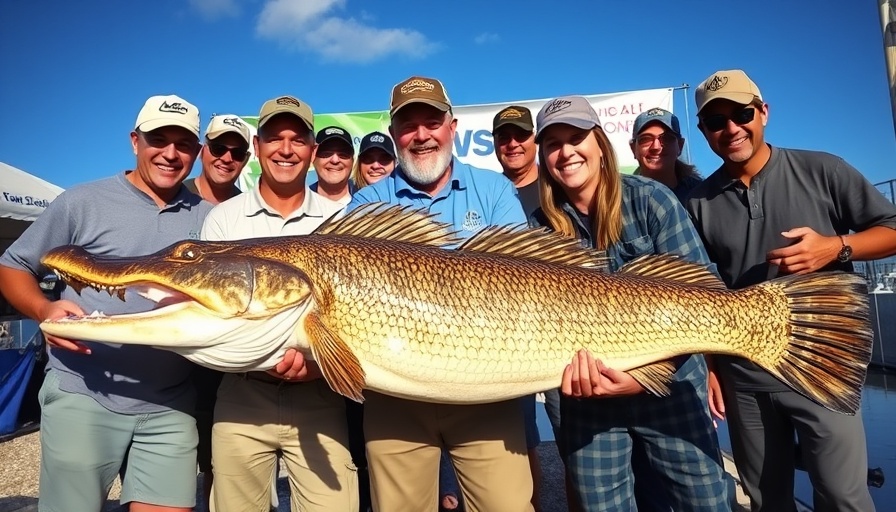
Why the Legendary Alligator Gar Stirs Curiosity and Concern
Alligator gars are fascinating creatures, captivating anglers and nature enthusiasts alike. Recently, a massive alligator gar was caught in Louisiana, significantly larger than the state record—20 pounds more, to be exact. However, despite its impressive size, it won't qualify for a state record due to the circumstances surrounding its capture. This situation raises discussions on the importance of conservation and fishing regulations.
The Unique Nature of Alligator Gar
Alligator gars are known for their distinct appearance, featuring a long, slender body and sharp teeth, making them an apex predator in their aquatic environments. These fish can grow to be quite large, sometimes exceeding ten feet in length. Catching one is a badge of achievement for any fisherman, but with such significant weight records comes the responsibility of adhering to fishing regulations to promote sustainable practices in the community.
Local Fishing Regulations: Why They Matter
In states like Louisiana, regulations are designed to protect certain fish populations while allowing anglers to enjoy their sport. Increasing sizes, such as the aforementioned giant gar, put pressure on local ecosystems, ultimately impacting not just the fish but local wildlife. Advocates emphasize the importance of following the rules since they serve to maintain the health of fish populations, which can otherwise suffer due to overfishing and habitat depletion. Anglers are thus encouraged to stay informed about size limits and other regulations to ensure the sustainability of this sport.
The Thrill of the Catch: A Personal Story
One might wonder why a single fish can elicit so much emotion and excitement. For many anglers in the MidSouth, the thrill of fishing extends far beyond the potential for a state record. It's about tradition, family bonding, and connecting with nature. One local fisherman shares his experience of catching a sizeable alligator gar, detailing the adrenaline rush and the immense pride he felt even though he released the massive creature back into the water. Such stories remind us that fishing isn’t just about the size of the catch but also the memories made along the way.
Health Benefits of Fishing: More than Just Sport
Engaging in outdoor activities like fishing can significantly impact your health and wellness. It provides not only physical activity but also mental health benefits. Spending time outdoors reduces stress and anxiety, while the rhythmic nature of casting lines can be meditative. For homeowners in the MidSouth looking to improve their wellness, fishing can be a wonderful way to incorporate physical activity into your lifestyle while enjoying breathtaking views of nature. Local fishing spots can serve as perfect venues for family outings or solo retreats.
What This Means for the Community
The recent catch of the giant gar provides an opportunity for the MidSouth community to reflect on its fishing culture and practices. Communities are encouraged to participate in educational programs focusing on sustainable fishing, fostering a greater appreciation for local wildlife, and promoting responsible fishing habits. Together, these efforts make a difference not only for future generations of anglers but for preserving the rich biodiversity that makes the MidSouth a unique place to live.
Join the Conversation and Get Involved
As the community discusses the significance of such catches, it is an ideal time for homeowners and nature lovers to get involved in local conservation initiatives. Participating in cleanup events, educating others about fishing regulations, or volunteering for local wildlife organizations can help foster a healthier ecosystem. By taking these small yet impactful steps, residents can contribute to preserving the beauty and vibrancy of the MidSouth for many years to come.
If you’re inspired by the stories of local anglers and want to learn more about sustainable fishing practices, consider reaching out to your local fishing community. Not only will you open a dialogue about fishing traditions, but you'll also explore the rich tapestry of life in our waters.
 Add Row
Add Row  Add
Add 



Write A Comment